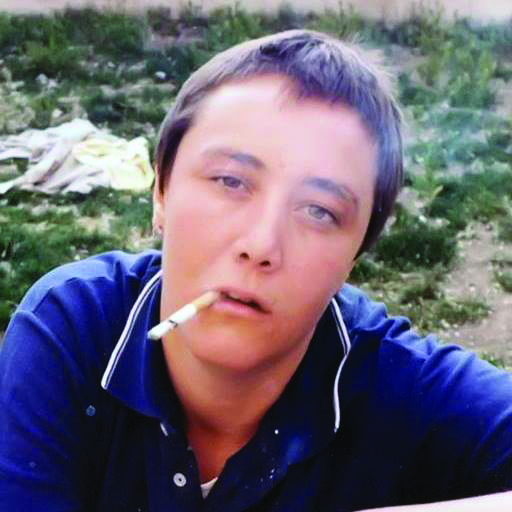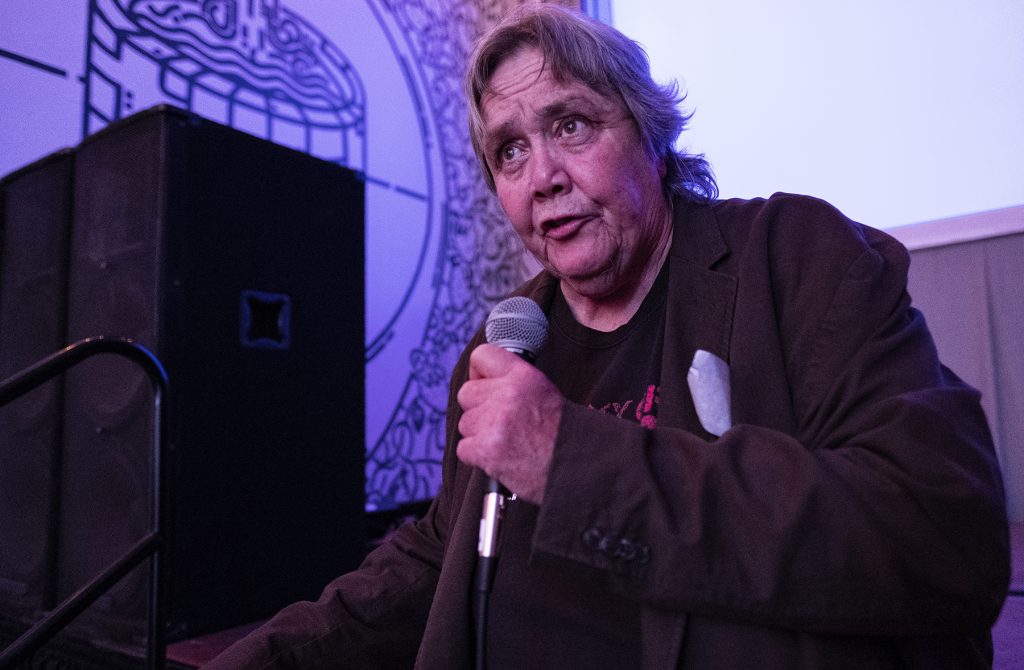
When speaking about how he knew Barbara Brust, Buffalo Sojourn takes a slow pause, and then says: “I didn’t know Barbara long, but I knew her deep.”
Buffalo met Barbara about two years ago. He was living on the corner of Shattuck and Addison, where he had decided to pitch his tent to keep an eye on an old friend who he’d heard was getting into fights and having a hard time. Barbara and some other members of Consider the Homeless!— the organization she started in her basement five years ago and which has grown to feeding 150 of Berkeley’s 1,000 houseless people twice a week—were out on the corner delivering soup. Barbara and Buffalo got to chatting, and a friendship was born.
Buffalo’s own story is long, with many chapters. He’s lived all over the country, at times housed and at other times on the street. He’s met a lot of people, among them various cohorts of do-gooders and non-profiters. Yet Barbara was special. “There’s a lot of hustle money in this business of helping the poor,” says Buffalo. “But with Barbara—her integrity was self-evident.”
Barbara Brust, known affectionately by many of Berkeley’s 1,000-some unhoused people as “the soup lady” wore many hats throughout her life. Founder of Berkeley’s Consider The Homeless!, ex-New York cabbie, lover of music, radical dyke, fighter, and protector of all, Barbara was the kind of person who made an impact on all those she met. To honor her years of feeding people and tireless activism for the poor, Street Spirit was working on a profile of Barbara when she died of breast cancer on February 25, 2021. She was 69 years old. She is remembered by the many who knew and loved her on the streets, in Berkeley’s advocacy community, and beyond, for whom we hope this article serves as a celebration of her life.
Barbara’s entrance into activism was in some ways accidental—a happy turn of fate stemming from her determination to make her own way in the world. At age 19, after a sometimes troubled childhood, Barbara got work as a cabbie in New York. She was one of the only women—maybe the only woman— in her fleet.
“I told them ‘hire me, or see me in court,’” Barbara remembered in February 2021, a wink of pride still folded into her brow fifty years later.
As she drove her route through the Bowery, a Manhattan neighborhood, she’d often run into “bowery bums”: men that would knock on her window with a greasy rag and offer to wipe her car in exchange for money.
“It never felt right giving them money because I knew they would just drink it and drinking would kill them,” Barbara said. “Even though at that point I was in the midst of drinking and doing drugs myself, I self-righteously thought it was far better to bring them food.”
So Barbara began packing along a bag of fruit or a loaf of bread on her route to hand to the bowery bums. Eventually, she began buying buckets of chicken, which she’d ask the cook to pack into two-piece boxes so she could pass out sustenance to more people.
“Food is a tool,” Barbara explained. “Looking someone in the eyes and saying, ‘I’m sorry, I don’t ever give away money but I’m more than happy to pick up some food for you if you want,’ is powerful—actually, just looking someone in the eyes does more than some people imagine.”
When people turned down food, which they often did, Barbara would stay and talk. “I’d wish them a dry night, a warm night, a cold night—whatever was bad for them on the streets that day, I’d wish them something better.”

From New York, Barbara traveled to New Mexico, where she found work as an AT&T telephone installer, and then around 15 years later moved to California, where she stayed for the rest of her life. She worked all kinds of jobs—manager at Berkeley Local Transport, inventory control at 1-800-software, stage manager at Woodminster Theater in the Oakland Hills.
A self-proclaimed radical dyke, Barbara advocated for members of the LGBTQ community in the same way she did for the people she met on her cab route: through consistent, sometimes unwanted, offerings of generosity.
Lekyn Schmatz met Barbara when they were both riding with Dykes on Bikes, the chartered lesbian motorcycle club whose revving engines and raucous screams kick off the SF Pride parade each year. Eventually they ended up working in a warehouse in Port Richmond together. Their coworkers were mostly straight men, and Lekyn and Barbara heard their fair share of locker room talk. When one of their coworkers made a comment about gay people, Barbara decided enough was enough.
“Barbara was never one to keep her mouth shut,” says Lekyn. Barbara tore into her coworker. Word made its way up to management, who told Barbara’s coworker to pack his things. “They were going to fire him,” remembers Lekyn, “but Barbara said ‘No. I said my piece. He heard me out. We’re good.’” Her coworker stayed, and they never had another issue.
Lekyn says that’s just how Barbara was. “She was very fierce about her values. She also insisted on taking care of her own business.”
Barbara was a passionate participant at the Michigan Womyn’s Music Festival—an almost Woodstock-esque, five-day woodland music celebration that started in 1976, where artists like the Indigo Girls and Tribe 8 came to play guitar and celebrate feminism and lesbianism. Barbara attended and worked at the festival for 25 years until it ended in August of 2015.
As that branch of Barbara’s life was cut short, an old one grew new roots. For Thanksgiving of 2014, she cooked a feast—turkey, cornbread, green beans, potatoes. Instead of eating alone, she set up a folding table at Provo Park and offered anyone who might be hungry to join. Many did. When night fell she packed the leftovers up onto plates and walked the streets of Berkeley passing them out. She did the next thing the same day, and the day after that she cooked something new. She had told a friend what she was doing and that night they walked the streets together. Slowly, others joined, and Consider the Homeless! (CTH!) was born.
“Barbara operated from a position of unconditional love,” says Paul Kealoha Blake, one of the early participants in CTH! and a close friend of Barbara’s. “She really felt that given a chance to eat, a chance to get sheltered, and a chance for connection, that people would be able to contribute more to their own lives and to the lives of those around them.”

Paul and Barbara met in 2015 at a memorial for a woman who died from exposure to the cold on the sidewalk outside Berkeley’s City Hall. Paul, a well-known figure in the activist community and not usually one to become emotional, began to cry. Paul says Barbara looked at him in surprise. Then, “Barbara just came up and threw her arm around my shoulder and said: ‘I understand.’”
Paul, like many others, remembers Barbara for her brash and unapologetic manner. She was a frequent participant in City Council meetings—often speaking so forcefully that people sitting around her would shrink into their seats to avoid association. On numerous occasions, Barbara took to the podium to read the names of every unhoused person who had died on the streets during a given year.
Yesica Prado was living in her vehicle at the Berkeley Marina when she met Barbara, who was protesting the city’s attempts to evict Yesica and the roughly 70 other people living there. When only 12 vehicles attempted to stay, Barbara showed up and started organizing. “Barbara created a space where people could come to feel empowered,” says Yesica.
For Barbara, Yesica remembers, her work with CTH! wasn’t just about providing a service, but about encouraging people to stand up for themselves, no matter who they were.
Hopeful and compassionate, Barbara was also an ardent realist. “One thing I never do is wish someone on the streets a ‘good’ night,” she said. “People do that to me now, and I can’t stand it. It’s like, I’m dying of cancer and you think I’m going to have a good night? What the fuck are you talking about?”
Last year, Barbara was diagnosed with Stage 4 metastatic breast cancer with metastasized bone lesions. Almost immediately, an army of supporters created a GoFundMe to help her pay for transportation to doctor’s visits, grab bars, and groceries. In seven months, close to 300 people donated $23,000 to help Barbara, almost double what the group set out to raise.
Even with her illness, Barbara remained a firebrand. Paul remembers: “When I used to come into her house after a round on the streets, she’d yell out from her bed and ask who it was. I’d say ‘It’s still Paul!’ and her response to that was always, without fail, “Still Paul? Fuck you!” This, Paul said, was Barbara’s way of telling him she loved him, without all the gushy parts.
Paul, hardened as Barbara was from a tough childhood, liked running the bit, but would eventually cave and tell Barbara how much she was loved. “My statement to her when I would leave each time would be, “I love you fearlessly.” After that farewell, Paul said, Barbara would always grow quiet.
Her plea, ultimately, was simple: that we treat people without housing as we would treat anyone else. An old photograph shows Barbara carrying a poster honoring Roberta Bonitas, the 50-year-old homeless man who died in his sleep on the corner of San Pablo and Addison in 2016 and whose body wasn’t reported to the Berkeley police until late morning.
“How many do you think ignored him before then?” her sign read.
Katherine Blesie is a reporter and editor for the Daily Californian’s Weekender magazine.
